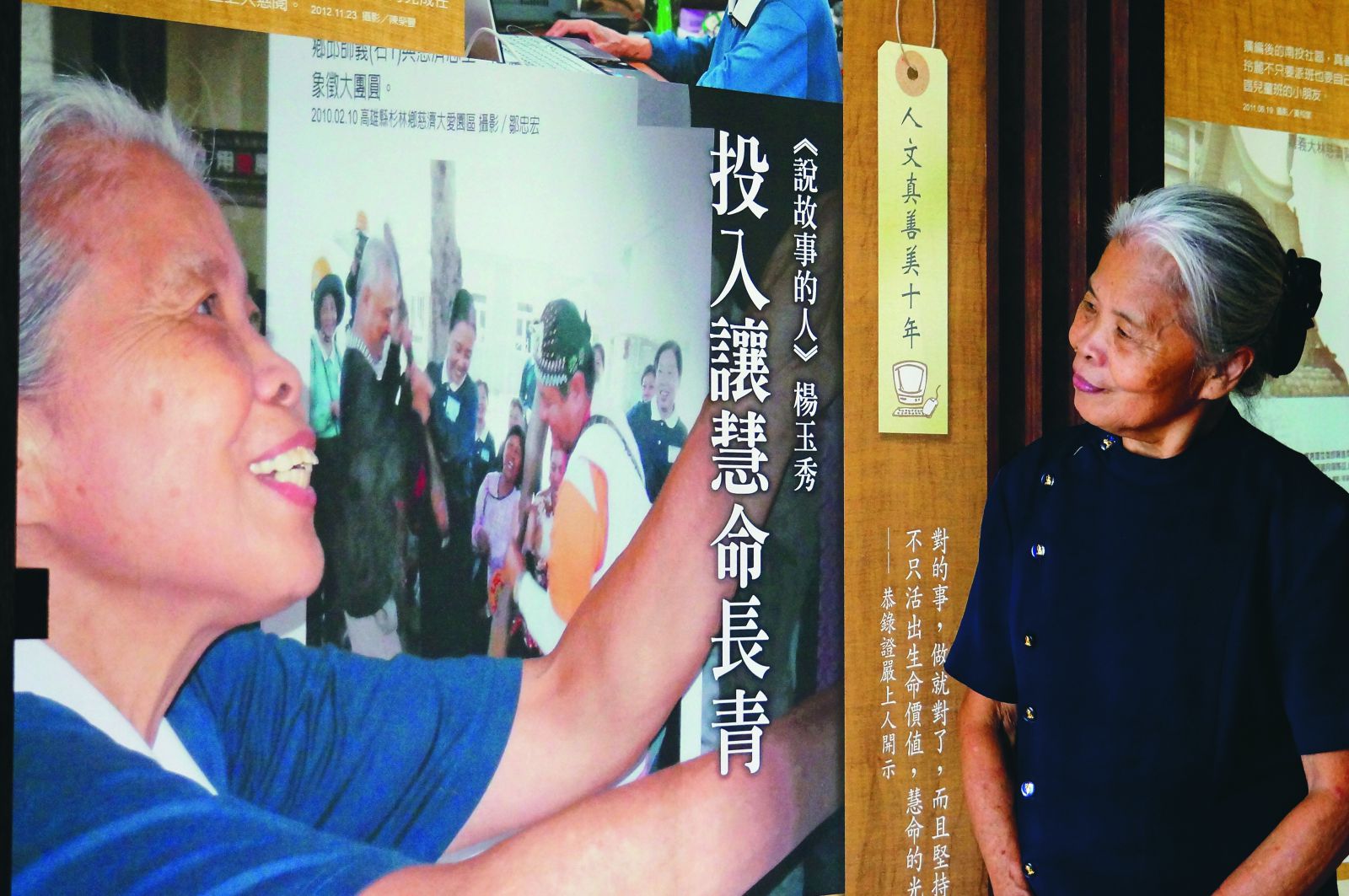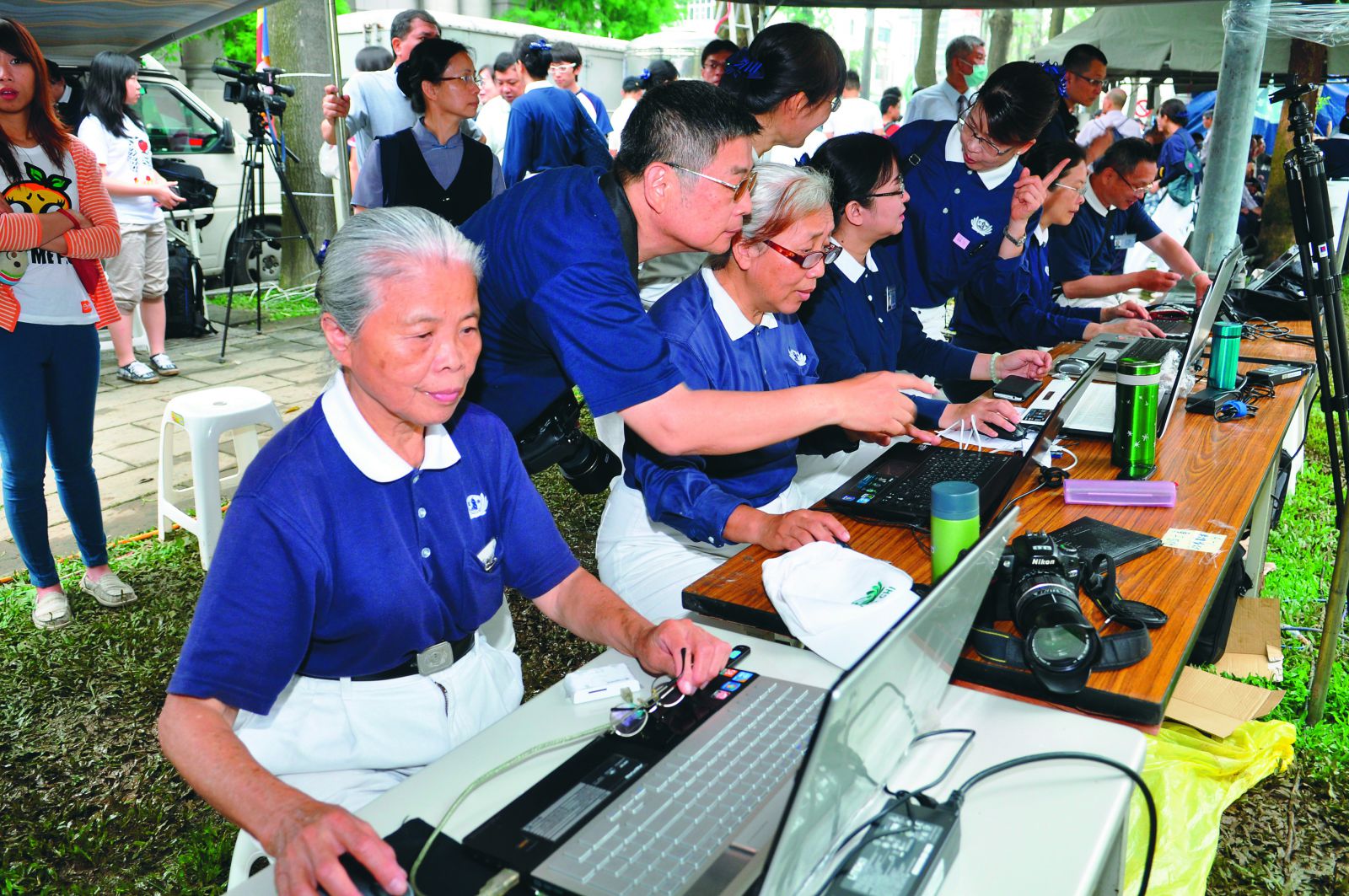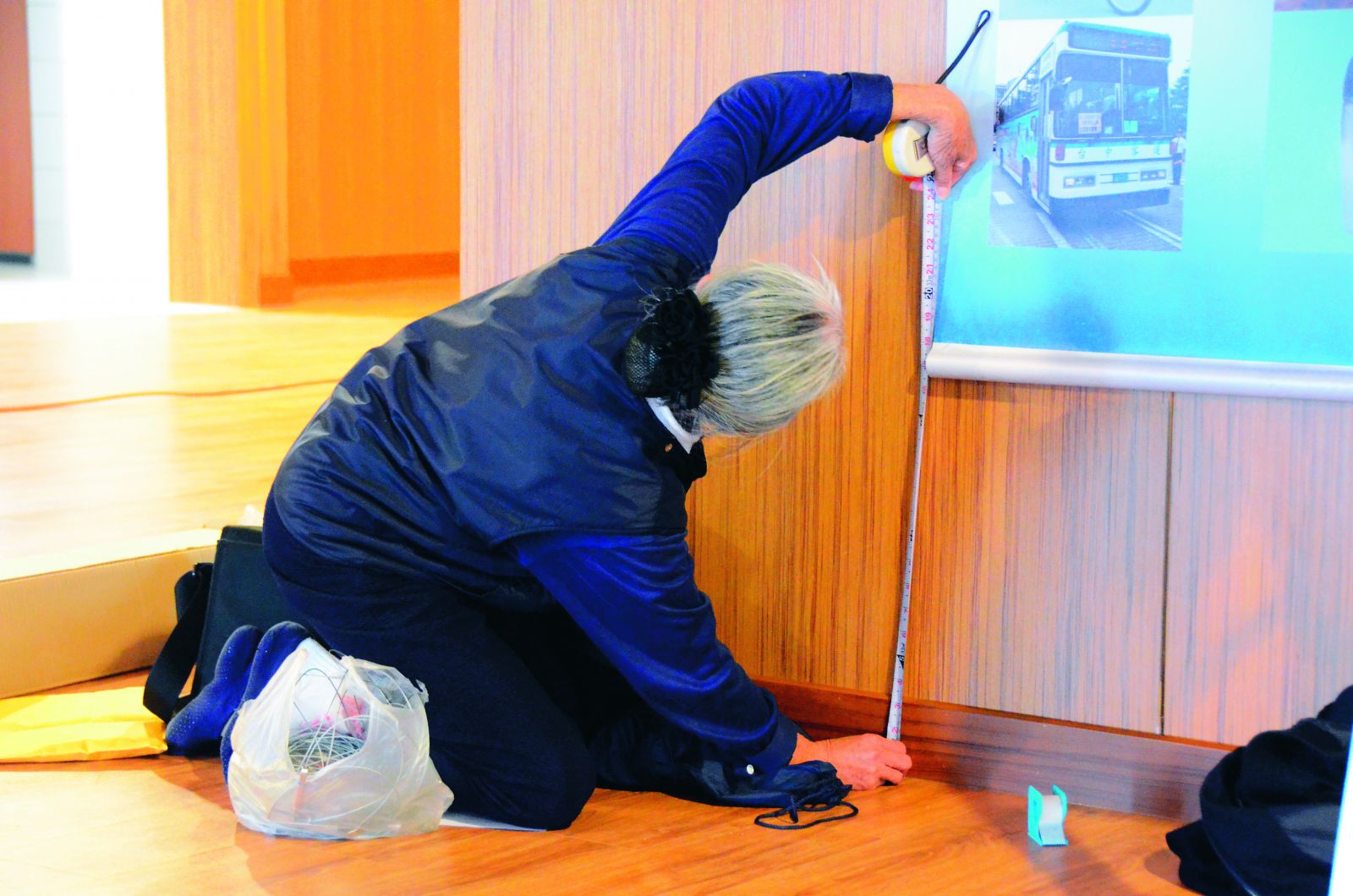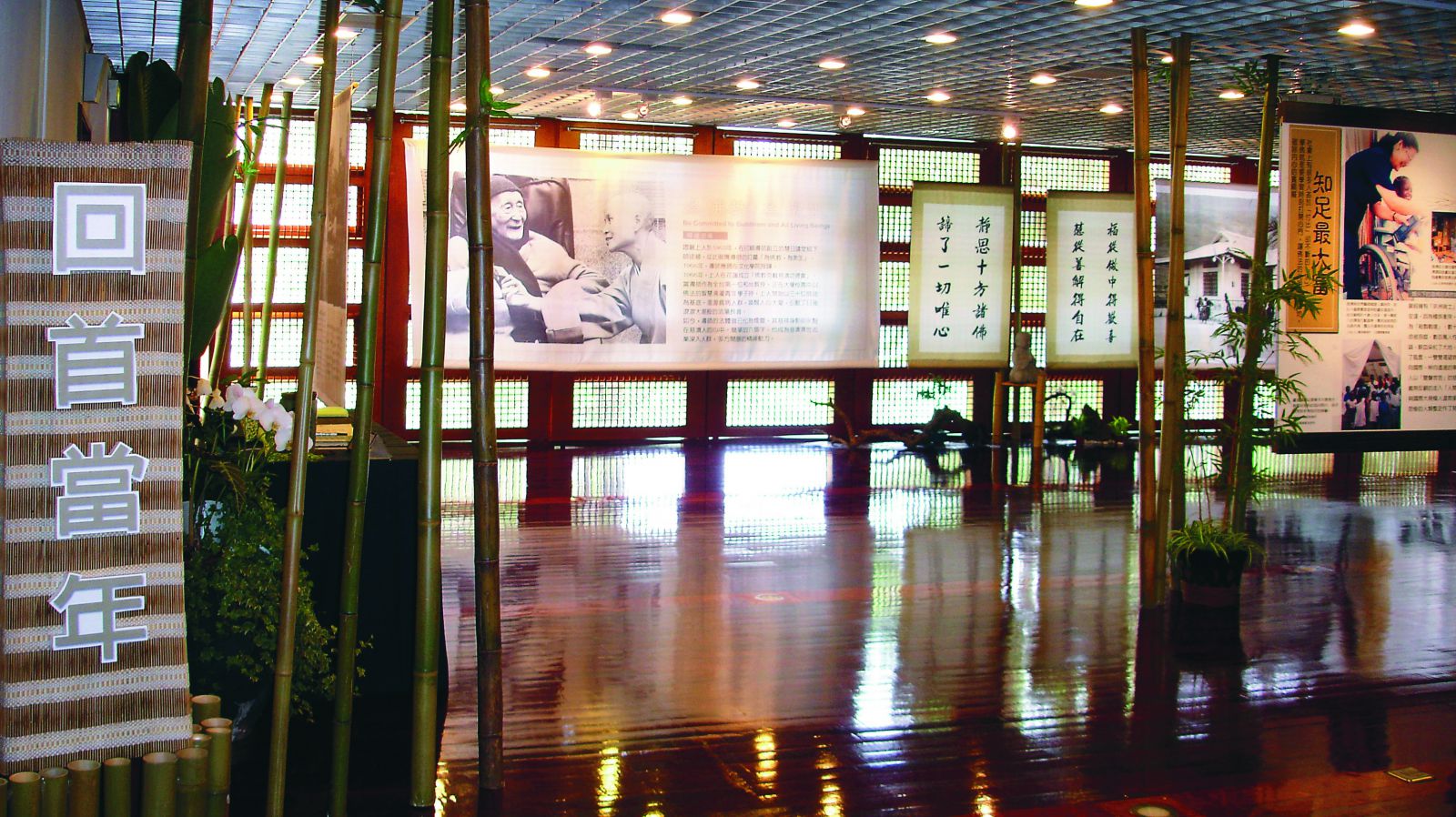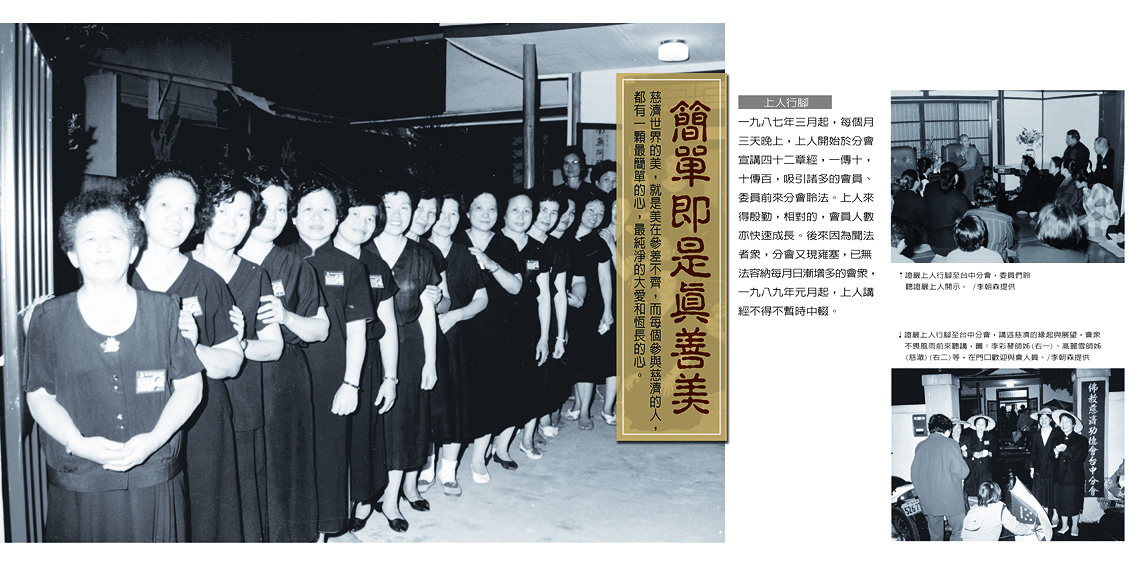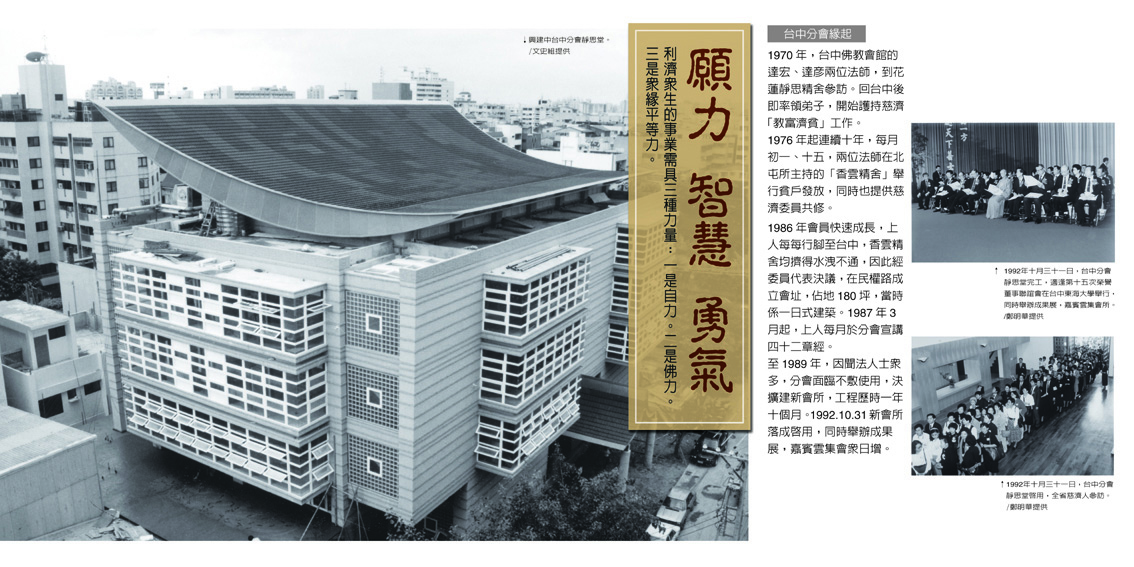

| Still Learning—Life Begins at 70 | |||||||||
| By Lin Shu-huai Translated by Tang Yau-yang | |||||||||
Large posters at Tzu Chi exhibitions take viewers back in time, as the history and charity work of Tzu Chi unfolds before their eyes. Producing such a display entails a great amount of time, energy, and creative endeavor. As a norm, youngsters dominate this field of expertise. But Yang Yu-xiu stands out from others in the art of poster design, and not only for her creativity. At age 78, she could easily be a grandmother to many people in this field. She is living proof that no one is too old to learn new tricks. Yang Yu-xiu (楊玉秀) sat erect in front of a computer, focused on composing a poster. The photographs had to be cropped just so in order to create a neat image that best brought out the message of the poster. Yang is a retired civil servant who lives in Taichung, central Taiwan. She often says, “Learn all you can about things you don’t know how to do; for those things you are good at doing, give your best.” Though nearly 80, she never lets her age get in the way of learning new things. Shattering the age barrier When a series of Tzu Chi workshops on making posters was about to be held in 2003 at the Jing Si Hall in Hualien, eastern Taiwan, Yang decided to sign up. She thought that such poster creating skills would come in handy when Tzu Chi was holding exhibitions featuring its relief work or retrospectives of its history. However, a prerequisite for taking the workshop was a working knowledge of Adobe Photoshop, a photograph-editing program. Yang, already 68 at that time, had no experience at all using that software. Despite her lack of experience, she didn’t allow the prerequisites of the class to daunt her. She figured that she’d just learn as she went through the course, and if she needed help, she’d ask for it. With this sort of determination, she went to see Huang Yu-ying (黃玉櫻) at the Taichung Tzu Chi branch office, and asked her to sign her up. Surprised, Huang thought for a moment before saying: “But it’s for people who can use Photoshop, and the workshop has a tight schedule—participants get little time for sleep. Are you up to it… at your age?” Yang replied resolutely, “Those concerns of yours don’t worry me. As long as I can get in, I’m sure I can handle it.”
When the participant roster for the first workshop was announced, Yang was sorely disappointed to find out that she was not listed on it. But she tried again as soon as the next workshop was open for registration. Huang submitted Yang’s registration form to Huang Wen-qin (黃文欽), who was conducting the series of workshops, and appealed to Huang to accept Yang even though she had not met the class prerequisites: “We have a volunteer here, a very old one, who wants to learn to make posters in your workshop. Can’t you bend the rules a bit and let her in?” Huang Wen-qin obliged. Some participants at the workshop, not expecting a classmate so old, mistook Yang for a service volunteer. It was an understandable mistake. Tzu Chi camps and workshops are normally supported by large numbers of service volunteers who arrange meals, snacks, lodging, transportation, and so on. It is not at all uncommon to find elderly volunteers in such roles. Thus those younger participants were surprised to find out that Yang, like themselves, was there as a student. Yang had a lot to tackle at the workshop. All her classmates were proficient at using computers and Photoshop, and some were already quite good at poster making, even without the benefit of the classes that they had signed up for. They were ready to learn in high gear. Yang, however, was nowhere near their level. Though she had volunteered for Tzu Chi for years, she had taken care of all the paperwork on paper. She had only a scanty knowledge of how to use a computer. In fact, she was still familiarizing herself with the keys on the keyboard when the class started. How could she jump directly from there to manipulating photographs or designing posters on a computer? While others were zipping through class materials, Yang was taking one slow step at a time. Casting her mind back to that time, she recalled, “That was ten long years ago. I only remember that whenever I had a question, I asked the teacher, and I made sure I had everything down pat.” She was fully aware that she was a mere beginner, so she was determined to put forth that much more effort to compensate for her deficiencies. At the outset of the workshop, Huang Wen-qin asked the participants to turn in five posters the next day about Tzu Chi activities in their communities. Yang was scared. She muttered, “Well, there goes my sleep!” She picked out several pictures from her computer folders and began to apply what she had just learned during the day. She cropped the photos, arranged them, edited them, adjusted their color, and added texts and captions. She kept tweaking them over and over again, and finally—who knows how long later—she finished her first poster. After completing all five posters, she finally went to bed. She remembers that she got only two or three hours of sleep that night. The next day came, and Huang asked the class to turn in the assignments. The classroom, packed with some 50 students, was unusually quiet. No one moved. They looked at each other, but no one dared sneak a peek at the teacher. The moment of truth was upon them. “Nobody did it?” Huang asked. “Really?” “Grandma Yu-xiu did, sir,” someone said, breaking the ice. At this, Yang turned in what she had finished. “Eh… not bad,” Huang lauded. “In fact, they look really nice!” His praise was a shot in the arm to Yang. Huang continued, “I used to accept only people younger than 45 years of age for our workshops. I won’t make that restriction anymore. Even 70-year-olds are welcome.”
A large exhibition Three years later, in 2006, Tzu Chi celebrated the 40th anniversary of its founding. Documenting volunteers from across Taiwan presented poster exhibitions of what the foundation had done in their own communities. Cai Mou-cheng (蔡謀成) was in charge of the documenting volunteers in the central Taiwan region. He tapped Yang Yu-xiu and Guo Ying-jie (郭英傑), a paid staffer, to set up an exhibition to be staged at the Taichung branch office. The theme was “Looking Back.” “Am I up to it?” Yang asked. Cai replied, “Give it a try!” So Yang and Guo started to put together things that they would need to put on a large poster show. Yang gathered photos and stories and began writing captions. She worked 12-hour days at the Taichung branch office until late in the evening, sometimes missing the last bus home. To free herself from the bus schedule, she rode her old bicycle. After a month of seemingly ceaseless work, the “Looking Back” exhibit opened. It was predominated by black-and-white photos, taking visitors through a time tunnel of Tzu Chi history into a nostalgic aura of bygone days. Visitors raved about the display. Yang felt richly rewarded. She was glad that her hard work and devotion had paid off. She did not know how much time she had remaining in life to do things like that, but she was grateful to have the opportunity to work on such a big project while she was still in good health, still able to put in long hours of work. Yang’s long hours during the time she worked on the exhibition, day in and day out, concerned her daughter, Chen Liang-ru (陳亮如). She could not bear to see her mother working so hard. “Mom went to Tzu Chi seven days a week, and she was hard at work late into each evening,” Chen said. “She didn’t even have any time to eat with us.” She didn’t want her mother to exert herself so much; instead, she wanted her to take it easy so she could do Tzu Chi work for a long time to come. However, Chen Kun-huo (陳坤火), Yang’s husband, was more accommodating. He said to her, “If a thing is worth doing, do it the best you can. Keep an eye on your own health, though. You’re not all that young any more. If you’re happy doing these things, then I’m happy, too.” Chen is a considerate husband. He takes care of things at home so his wife can devote herself to Tzu Chi work. What’s more, he helps her work through challenges. When Yang sees things that she feels should be improved on, she speaks her mind frankly. This straightforwardness inevitably gets her into disagreements with other volunteers, leaving her dispirited. Chen tells her gently, “If you’re wrong, correct it. If you’re right, but things just can’t be helped, let it be.” With help like that, Yang has been able to keep volunteering in her community, at large Tzu Chi group activities, and on international disaster relief missions. “Day and night, you work so hard—aren’t you tired?” people often ask her. “No,” she answers, “not when I think of how Master Cheng Yen has never complained of fatigue during her more than four decades of hard work.” With that thought, she pushes forward. Even when her vision is blurred and her body is tired, her heart is fulfilled and content. I’m old, but my computer can’t be Yang never lets a training class slip by. She signs up for every workshop on multimedia or poster production. She also volunteers to help compile articles and photos documenting Tzu Chi camps. The last thing she wants is to sit idle at home. When a new complex was about to open at Taichung Tzu Chi Hospital in August 2011, she worked with a team to make posters to be displayed at the new complex. Every day she took the bus for the hour-long journey to the hospital and back home again at the end of the day, despite the fact that her foot had been injured. She walked slowly. In one hand was a walking stick, in the other a handbag. The tool of her trade—a notebook computer—hung in a bag from her shoulder diagonally across her torso. “Your computer looks heavy,” fellow volunteers said to her, concerned about her foot injury. “Oh, I used my old computer for five years,” she replied cheerfully. “To keep up with my work, I got a new, more powerful computer. I may be old, but my computer can’t be.” While people her age typically spend their time in leisurely pursuits, Yang chooses to keep challenging herself by doing the more demanding work of poster design and serving as a documenting volunteer. Her endurance and dedication have won Huang Wen-qin over. Huang has trained Tzu Chi volunteers in poster making for a long time. He often uses Yang as an example to encourage young volunteers to take on more responsibilities and learn new things. “The example of Sister Yang Yu-xiu leaves us with no excuse for being lazy. Looking at her, we can never say that we don’t know how to do something or that we’re too old to learn.”
Conscientious Initially, Yang copied the formats of other people when she created paper records to document Tzu Chi events or camps. One day, as she was looking at some paper records made by another volunteer, she noticed that the volunteer had laid out the records like a magazine, elegant and attractive. “Ah, why didn’t I think of that?” she exclaimed. Inspired, she began designing and creating her own formats for her records. “When I pick up a magazine, such as the Tzu Chi Monthly, I read its articles and study its layouts. There aren’t shortcuts in doing things,” she advises. “Just observe others’ fine features, practice diligently, and you’ll naturally get the hang of it.” Yang feels that the records of Tzu Chi events should be as clear as possible so that the history of Tzu Chi can be well preserved. A record should give readers a good sense of being there when they cannot go to the event in person. Yang also strives meticulously for accuracy. To prevent mistakes, she carefully double-checks everything. She freely shares her experience with other volunteers. She is a good teacher, a good friend, and at times a good mother to them. She answers their questions, provides them with helpful information that is not always asked for, and reminds them to drink water and eat at proper hours. Yang is still in good health, and her steps are light and steady. Most importantly, she is young at heart. With her passion for learning, she epitomizes the maxim, “Life begins at seventy.” Tzu Chi Foundation 40th anniversary “Looking Back” poster exhibit at the Taichung Tzu Chi office Photos by Gu Ting-he
|














|

